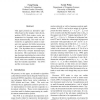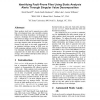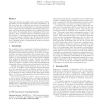100
click to vote
NAACL
2007
15 years 3 months ago
2007
This paper presents an alternative algorithm based on the singular value decomposition (SVD) that creates vector representation for linguistic units with reduced dimensionality. T...
171
click to vote
NIPS
2008
15 years 3 months ago
2008
The Singular Value Decomposition is a key operation in many machine learning methods. Its computational cost, however, makes it unscalable and impractical for applications involvi...
105
click to vote
ICWSM
2008
15 years 3 months ago
2008
The diffusion process on weblogs has attracted great interest since the early days of weblog studies. We propose a ranking technique which extracts topics and innovators by analyz...
EMNLP
2007
15 years 3 months ago
2007
Following (Blitzer et al., 2006), we present an application of structural correspondence learning to non-projective dependency parsing (McDonald et al., 2005). To induce the corre...
110
click to vote
COLING
2008
15 years 3 months ago
2008
Latent Semantic Analysis (LSA) is based on the Singular Value Decomposition (SVD) of a term-by-document matrix for identifying relationships among terms and documents from cooccur...
117
click to vote
CASCON
2007
15 years 3 months ago
2007
Static analysis tools tend to generate more alerts than a development team can reasonably examine without some form of guidance. In this paper, we propose a technique for leveragi...
151
click to vote
HICSS
2010
IEEE
15 years 4 months ago
2010
IEEE
1 The latent semantic indexing (LSI) methodology for information retrieval applies the singular value decomposition to identify an eigensystem for a large matrix, in which cells re...
125
click to vote
ISSAC
1995
Springer
15 years 6 months ago
1995
Springer
This paper introduces singular value decomposition (SVD) algorithms for some standard polynomial computations, in the case where the coefficients are inexact or imperfectly known....
137
click to vote
CIKM
2006
Springer
15 years 6 months ago
2006
Springer
The blogosphere--the totality of blog-related Web sites-has become a great source of trend analysis in areas such as product survey, customer relationship, and marketing. Existing...
141
click to vote
AMDO
2004
Springer
15 years 6 months ago
2004
Springer
Abstract. A new algorithm for the incremental learning and non-intrusive tracking of the appearance of a previously non-seen face is presented. The computation is done in a causal ...




